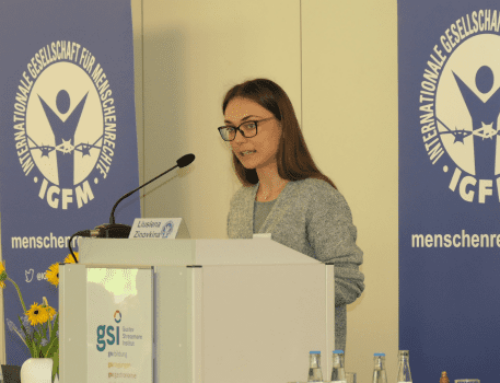Monitoring of criminal proceedings of V. Tyapkin (session 04.01.20)

On April 01, 2020, the Lutsk City Court of the Volynsky Region heard a case on charges of V. Tyapkin committing a crime, under Part 3, Article 289 of the Criminal Code of Ukraine – illegal possession of a vehicle.
At the hearing, the prosecutor was scheduled to submit written evidence. However, the accused’s lawyer stated that he was feeling unwell and requested to limit consideration to the application of the prosecutor’s request for an extension of detention. The prosecutor requested an extension of the measure of restraint. But the lawyer said that the prosecutor argues his position solely by the gravity of the crime. In turn, the lawyer filed a motion to change the measure of restraint to house arrest. He also indicated that for a long time the accused did not have social ties, which is important for choosing this type of measure of restraint. However, at the time of this court hearing, there is a person with whom the accused will be able to live during the period of house arrest; they could not let him into the courtroom because of quarantine measures.
As a result of the review, the prosecutor’s request was granted due to the fact that the judicial investigation was not completed, and all the witnesses were not questioned.
The European Court of Human Rights notes that national courts must first ensure that in a particular case the detention of the accused does not exceed a reasonable time. To do this, they must, taking due account of the principles of the presumption of innocence, investigate all circumstances of the case, which can confirm or refute the existence of a social need that justifies deviations from the requirement to respect individual freedom, and indicate this in their decisions to extend the term of detention. The question of whether there has been a violation of paragraph 3 of Art. 5 for the protection of human rights and fundamental freedoms (hereinafter referred to as the Convention), the Court must decide, relying mainly on the grounds cited in these decisions (“I.A. v. France”, para 102).
According to paragraph 3 of Art. 5 of the Convention after a certain period of time, just the existence of reasonable suspicion does not justify the deprivation of liberty, and the courts must give other reasons for the extension of detention (“Borisenko v. Ukraine”, para. 50). Moreover, these grounds must be clearly indicated by the national courts (“Eloev v. Ukraine”, para. 60, “Kharchenko v. Ukraine”, para. 80).
The court often found a violation of paragraph 3 of Art. 5 of the Convention in cases where national courts continued to be detained, referring mainly to the gravity of the charges and using template language, without even considering specific facts or the possibility of alternative measures (“Kharchenko v. Ukraine”, paras 80-81; “Tretyakov v. Ukraine” para. 59).
The existence of a reasonable suspicion of a crime committed by a detained person is an indispensable condition for the legality of her continued detention, but after the lapse of time such a suspicion will not be sufficient to justify prolonged detention. The court never attempted to translate this concept into a clearly defined number of days, weeks, months or years, or at different times depending on the gravity of the crime. Once “reasonable suspicion” is no longer sufficient, the court must establish what other grounds given by the courts continue to justify the person’s deprivation of liberty (“Maggie and Others v. The United Kingdom”, paras. 88-89).
The ECtHR also recalls the immutability of the grounds for suspicion. Suspicion that the arrested person has committed an offense is a “sine qua non” condition in order for his continued detention to be considered legal, but after a while this condition ceases to be sufficient. Then the Court must establish other grounds on which the decisions of the judiciary are based, continue to justify the deprivation of liberty. If these grounds turn out to be “relevant” and “sufficient”, then the Court will ascertain whether the competent national authorities found “special good faith” in the conduct of the proceedings (“Labita v. Italy”, para. 153).
Representatives of the ISHR are concerned about the attitude of prosecutors towards extending detention. Prosecutors do not properly prove the existence of risks, which leads to shifting the burden of proof to lawyers. And in this case, the court, deciding on the application of the measure of restraint requested by the prosecutor, must either take the side of the prosecution, independently substantiating the need for detention, or adopt a ruling without proper motivation. This negative trend is systematic in all regions of Ukraine and is part of the general trend of automatic extension of measures of restraint.








Leave A Comment